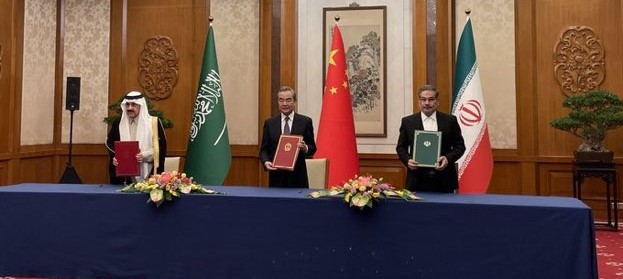SRINAGAR: In a Himalayan development that will have huge consequences for regional peace and the Muslim world, arch-rivals Iran and Saudi Arabia have agreed to revive diplomatic relations after a long hiatus. What is interesting, it was China that played the broker. The two countries will unlock their diplomatic missions within the next 60 days.

“The three countries announce that an agreement has been reached between the Kingdom of Saudi Arabia and the Islamic Republic of Iran, that includes an agreement to resume diplomatic relations between them and re-open their embassies and missions within a period not exceeding two months, and the agreement includes their affirmation of the respect for the sovereignty of states and the non-interference in internal affairs of states,” a joint statement issued by the three countries earlier in the day said. “They also agreed that the ministers of foreign affairs of both countries shall meet to implement this, arrange for the return of their ambassadors, and discuss means of enhancing bilateral relations.”
The joint statement was the outcome of negotiations that, n the final leg, continued for five days. “The deal was abruptly announced after five days of intensive and secret talks in the Chinese capital Beijing,” Tehran Times reported. “It was signed by Ali Shamkhani, secretary of Iran’s Supreme National Security Council, Musaad bin Mohammed Al-Aiban, the Saudi National Security Advisor, and Wang Yi, Member of the Political Bureau of the Communist Party of China (CPC) Central Committee and Director of the Foreign Affairs Commission of the CPC Central Committee.”
This China-mediated Iran-Saudi Arabia reconciliation is a black swan event-a surprise, rare watershed moment for international relations that’ll have major ripple effects across the globe, including South Asia-especially Pakistan-where Iran-KSA rivalry has played out heavily.
— Michael Kugelman (@MichaelKugelman) March 10, 2023
“The three countries expressed their keenness to exert all efforts towards enhancing regional and international peace and security,” the statement concluded.
The Saudi Press Agency reported that the talks held during March 6-10, 2023 in Beijing were in response to the initiative of Chinese President Xi Jinping and based on the agreement between President Xi and the leaderships in Saudi Arabia and Iran, whereby China would host and sponsor talks between the two countries.
The two countries snapped diplomatic ties on January 3, 2016, a day after Saudi embassy was stormed by angry Iranian protestors following the execution of a Shia cleric in Saudi Arabia. On January 2, 2016, Riyadh executed nearly 50 people including prominent Shia cleric Nimr al-Nimr.
Post-cold war between the two, oil facilities in both Saudi Arabia and the United Arab Emirates came under attack by actors believed to be Iran-backed, including Yemen’s Houthi rebels, with whom, Riyadh is engaged directly.
Amid lowest ever ties and “proxy wars”, efforts at revving relations has been going on since April 2021. For the first time the two countries had a meeting in Baghdad on April 9, 2021 and the process continues and four rounds take place till ran pulls out on March 13, 2022, after fresh executions in Saudi Arabia. So far, five rounds of talks were held in Iraq, with Oman supporting the reconciliation. The final round of talks was going on in Beijing since March 6.
“The move comes as China expands its diplomatic outreach in the Arab world. In December, Chinese President Xi Jinping was welcomed in Riyadh in an extravagant ceremony as part of a visit that brought together 14 Arab heads of state,” American broadcaster, CNN reported from Abu Dhabi. “That was just months after a relatively low-key meeting with US President Joe Biden, whose relationship with Saudi Arabia has been frosty.”
China brokering peace between arch rivals is being seen as a bold diplomatic position. Interestingly, Iran was already facing music from the US and, off late, Saudi Kingdom had been lukewarm towards the major global power.
In a statement on its website, the Chinese foreign ministry quoted top diplomat Wang Yi as saying the agreement represented “a victory of dialogue and peace”.
“This shows that the Ukraine issue is not the only problem the world faces today,” Wang was quoted saying by South China Morning Post. “[We face] many problems related to peace and people’s livelihood that deserve international attention, and timely handling by the relevant stakeholders. But regardless of their complexity and difficulties, they can be resolved through dialogue on equal footing and with mutual respect.”
Wang said Chinese President Xi Jinping guided the talks from the beginning, and the agreement between the three parties was testimony to the merits of Beijing’s “recent proposal” on handling international affairs. China, it may be recalled here sources 40 per cent of its fuel requirements from the Gulf.
“China’s role in hosting the talks that led to a breakthrough in a longstanding regional rivalry highlights the country’s growing economic and political importance in the Middle East, a region that was long shaped by the military and diplomatic involvement of the United States,” The New York Times reported. “The rivalry between the two Islamic nations, which are less than 150 miles away from each other across the Persian Gulf, has long shaped politics and trade in the Middle East. It has a sectarian dimension — a majority of Saudi Arabia’s population is Sunni, while Iran’s is overwhelmingly Shiite — but has predominantly played out via proxy conflicts in neighbouring Yemen, Iraq and Lebanon, where Iran has supported militias that Saudi officials say have destabilized the region.”















